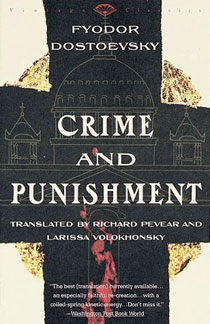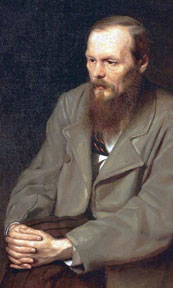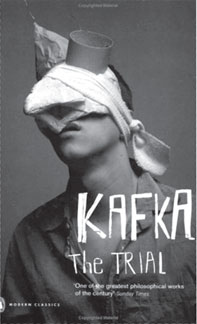|
Two personal investigations of the act of reading:
Kafka, Dostoevsky and inventing
By Pablo D'stair
[Part -2]

 |
|
Fyodor Dostoevsky |
As a reader, I truly do not care what I read-the art of the read, the
thought process is not dependent on my trying to decipher a piece of
writing, is not a matter of my attempting to understand the author or
their viewpoint, instead it is to invent, to unearth my own thoughts, my
own voice. I go so far as to say the totality of a work is wholly
unnecessary-I am not only incapable of taking in the totality, but find
no discernable difference in how a work affects me, whether I read it in
whole or in part.
****
I remember the first time I read Franz Kafka's The Trial. I came upon
it the way I preferred to come upon books back in the days I spent time
reading-Kafka's was a name I was generally aware of, some inkling of
what the book was about existed in my head from overhearing this or that
person speak of it, but for all intents and purposes I just saw it on
the shelf enough times that I picked it up and read it, blind.
I must point out that when I say "I read it", I had no idea it was an
incomplete text, that it was, as far as my personal philosophy has it,
not a novel, but a portion of writing in no way finalized, a statement
only by virtue of having been presented to me as a book. I read it, that
first time, as though it was a novel, an entirety with distinct and
discernable aim--and having read it as a whole, I considered it as a
whole.
Kafka's words
It wasn't until I had spent a good deal of time with Kafka's words in
my mind that I began wondering if, indeed, I should state the matter in
such a way. Did I have Kafka's words in my mind? Certainly in the most
literal sense he was the originator of the prose, but didn't the fact
that these words were only part of an unarticulated statement put them
into question?
****
Let me be somewhat more specific on how my mind got troubled:
Were I to have read only the first section of Dostoyevsky's Crime and
Punishment (up through Raskolinkov scurrying back to his room and
secreting the handful of evidence from his murder in the wall) and the
final section (Raskolinkov walking down the street, falling to his knees
and screaming out his confession) could I say that I have ground to
interpret the statement made by the novel?
In this case, I would have to say No, certainly not-principle aspects
of the thing would be missing entirely, from characters to situational
development to philosophical erudition. Without the center of the text,
the understanding as Dostoevsky would have it is lost, the novel takes
on a different form, becomes, in a manner of speaking, an abomination of
the literature.
Yet this is all I have of The Trial-that this is all that exists
hardly seems to matter, in fact seems a rather morbid excuse for grave
robbing, for stealing from the artist his voice, his form, his eternity
only to be a puppet to substitute in my own.
****
I said earlier that before I read Kafka's work I had in my mind "some
inkling of what the book was about"- I understood that the thing
concerned a man who was put under arrest for a crime that he is never
given the particulars of and that he is eventually put to death for it.
And this did seem to be what the novel was about, it seemed this could
be supported by what I read and so it was through this filter I first
explored it-then when I returned to the work, this borrowed impression
redoubled from my own reading, this summary continued to play primary
role in my understanding and in the construction of my own interpretive
thoughts.
Something in this got to bother me, though-I would run in to other
people who had never read the book, yet who had the exact same
understanding as I did about it, could, without having read a single
word of it, speak on the subject of it just as well and thoroughly as I.
It was during one such encounter, in fact, that I learned the novel was
not complete, that, as a matter of fact, a very, very large portion of
it had not been written.
Understanding
I forced myself-consciously-to find something in the book to
contradict this offhand understanding a non-reader of it shared with me,
could not feel comfortable with the fact that reading it was resulting
in the same thing as hearing an offhand summation from a third party.
During my next read, I fixated on the mystery of the opening
sentence: "Someone must have made a false accusation against Josef K.,
for he was arrested one morning without having done anything wrong."
(trans. Idris Parry)
Already this was very different that my little synopsis
understanding, my shared understanding with the non-reader. That there
is even the suggestion that "false accusations" were made against him is
not the same as K. just being arrested entirely out of the blue-the
forces invading K.'s life at least seem to have origin in another party.
So, this means that it is not an utterly absurd mechanism K. finds
himself caught in (it is still an incredibly absurd one, just not
totally) this suggests K. cannot be told what he is accused of not
because he is accused of nothing, but that he is either willfully not
being told or the parties marching him through endless bureaucratic
machinations are largely unaware of the details. Whatever the case, K.'s
innocence is flatly stated, so this suggested "false accuser" seems as
much a flat fact-otherwise the statement would be merely "Josef K. was
arrested one morning without having done anything wrong."
A trivial thing, perhaps, but it turned the novel inside out and in
doing so the lack of a center became an abyss.
Missing section
I was told that though the novel was never completed, there existed
some evidence of how Kafka intended to proceed, outlines of the missing
section that could, on investigation, suggest a direction to the
authorial statement. I fully admit I have not studied such outlines or
any of Kafka's correspondence on the matter, but think this irrelevant,
at least to my own personal encounter.

 |
|
Franz Kafka |
I turned to my thinking as a writer-when was my statement, in the
form of my written work, complete, when did it take on form enough that
definitiveness was not needed to be all but assumed? Did such a time
exist?
In my experience, I find it does not-in situations where I have
crafted and committed to paper some map of how a work is intended to
proceed, even in some few situations where I have penned the final
paragraphs well before the rest of the text, it is never with
certainty-my own understanding during creation as well as my
understanding of unconscious expression I cannot understand until
reflected on only become solidified, become 'the novel,' by the act of
creation taking place, fully (in fact, in every instance where the
concluding paragraphs were written in advance, they were abandoned
entirely when it came time to actually write a conclusion).
****
To my reading of Kafka's horror show, it could easily be imagined
that in some offhand, unwritten passage-perhaps by some lowly, even
unaffiliated party, some duty-clerk or next door neighbor--Josef might
be explicitly told what crime he stands accused of, in minute detail,
and yet discover nothing changes for this knowledge, his pleas of
innocence continue to fall on ears simply disinterested in hearing them,
ears which perhaps find them irrelevant.
However, it could not be said that the inclusion of such a passage
would not drastically alter the idea of the thing, would not paint K.'s
situation with a different brush-a wrongful accusation is not the same
as no accusation at all.
Complete work
And all of this is well and good, but I think it is time to return to
my point about totality being irrelevant to the reader.
I do not even recall the totality of the incomplete work-The Trial
remains fluid and would remain fluid even were I to have the book before
me, were I to pour over the words endlessly, keep detailed notations of
my impressions, of possible correlation between X passage and Y. The
same can be said for any novel, even a complete one-I will come away
with an incomplete and it would be impossible, utterly, to ever
articulate a completeness.
So, does this make irrelevant the intent, the statement of author?
****
I ask myself as an author "What is the statement of my own work?
Would it trouble me to know that even one third of a novel of mine had
been excised? Would I think there was meaning in what readers had to
say, if they were speaking only with regard to a truncated text, or
would I suggest to them that it is necessary to restore the work before
their thoughts have gravity?"
I answer as an author (after some long pauses of earnest
contemplation) "I personally find the statement of any of my works too
multifaceted to set down-certainly I find it unacceptable to allow that
anything I write could be summed up in terms of a sentence as simple as
'a man is accused of some crime he is never given the details of and is
eventually put to death for it'. It would trouble me if even one
third-even one tenth, even one page-of one of my works was excised.
And...as to the third question, I cannot find myself in agreement with
any answer I start to give, just find myself adrift and unsettled."
Relevance
Let me redirect: Is there relevance to the center of a text without
the beginning, the end, or both?
I think so. Conclusions, especially, seem to exist for little reason
other than that there is a last page and conclusions conclude nothing,
in fact the culmination of a book is designed, intrinsically, to return
the reader into the center-the beginning, of course, exists for no other
reason than to propel the reader on into the middle ground.
It is in this middle ground that the blood of a novel flows, that the
truth, so to speak, of what is presented can be grappled with.
Conclusions are irrelevant and somewhat artificial-as a reader I truly
put little stock in them, indeed I might dig through the textual guts in
endless attempts to disavow them.
That Kafka's work seems to be largely about uncertainty, built of
paradox, of enigmatic despair does not get me away from having to accept
it either as a novel or not. And in accepting it as not, I return to
where I started: As a reader, I truly do not care what I read.
****
As a writer, though, I care very much what I write-so how do I
reconcile this divergent attitude? Why do I concern myself with writing
a totality when this totality is only as valid, as imperative, as equal
in value to a readership as if they were to tear it into pieces, treat
these piece as separate literary objects-in fact, why do I concern
myself, knowing full well this is what a reader has no choice but to do?
Even an incomplete work takes on a kind of totality-what exists of
The Trial should be taken as a whole, it seems unacceptable to, for
example, forget about the ending chapter, investigate Kafka's statement
in the absence of his (at least probable) conclusion.
So perhaps as a writer I want to make as complete an incomplete as I
am capable of?
That puts a smile on my face, but I think it moves me away from what
I am investigating.
Literature
Is it true that cutting pieces out of a text and examining them as
individual objects of literature without having read the whole is that
same as having read a work in its entirety, having the "statement as a
whole" in mind when conducting these investigations of component?
My honest response is that to regard the pieces without the context
of the larger work may be the purer way to approach them, as a reader,
as an inventor.
Returning to my earlier example of Dostoevsky, I personally find the
conclusion of Crime and Punishement somewhat melodramatic, somewhat
forced upon me, and my thinking of the novel deals more with my wanting
to understand the meandering, manipulative nature of guilt, the mind
turned against itself yet at the same time acting in a kind of moral
self-defense. With it in mind that Raskolinkov cudgels himself into a
rightful sense of remorse and a desire to atone does influence my
reading passages of him in the throes of his torments-I am forced, if I
want to truly engage with the work, to image these nightmares
Raskolinkov puts himself through not being built of an authorial design
to emphasize the later desire for righteous confession and acceptance of
condemnation-I have to treat the novel, in this sense, as incomplete,
have to only focus on the moments of it that exist before culmination.
Statement
That Josef K. had "done nothing wrong" is an interesting statement,
one I find I always have to reinvent. I cannot accept it, of course, as
a statement absolute, can only reference it back to the idea of his
false accuser-K. had not done the particular wrong he was accused of,
but surely it is going absurdly too far to suggest he is man who may not
have done something else, who may rightfully be deserving of the lost
world he is made to inhabit.
Were I to see him in this light, as a guilty man, does it make me a
silly reader, does it suggest that I have missed the point?
Because I can well imagine that it is for some other crime, entirely,
that K. is put to death "like a dog," some wrong he was never accused
of, that remains hidden behind so glib an understanding of innocence-and
there is just as much in the text to suggest this as to contradict it,
just as much in a false accusation to investigate and enact consequence
over as in a righteous one.
****
I think a reader does not need totality as much as a writer is
incapable of producing it-indeed, as a reader I cringe and sweat,
attempt to maneuver out of the confines of the text, attempt to wrest my
arms free from the two men walking me silently through the streets of
the city some cold, nameless morning to deliver me a conclusion I am
helpless to understand.
|

